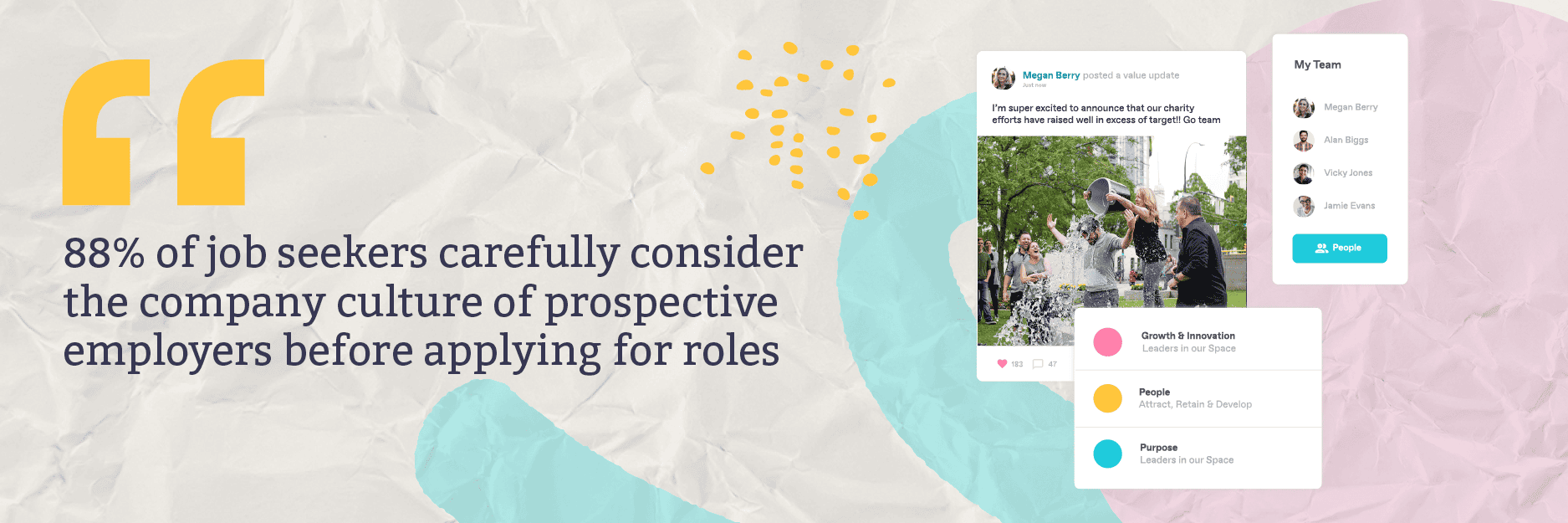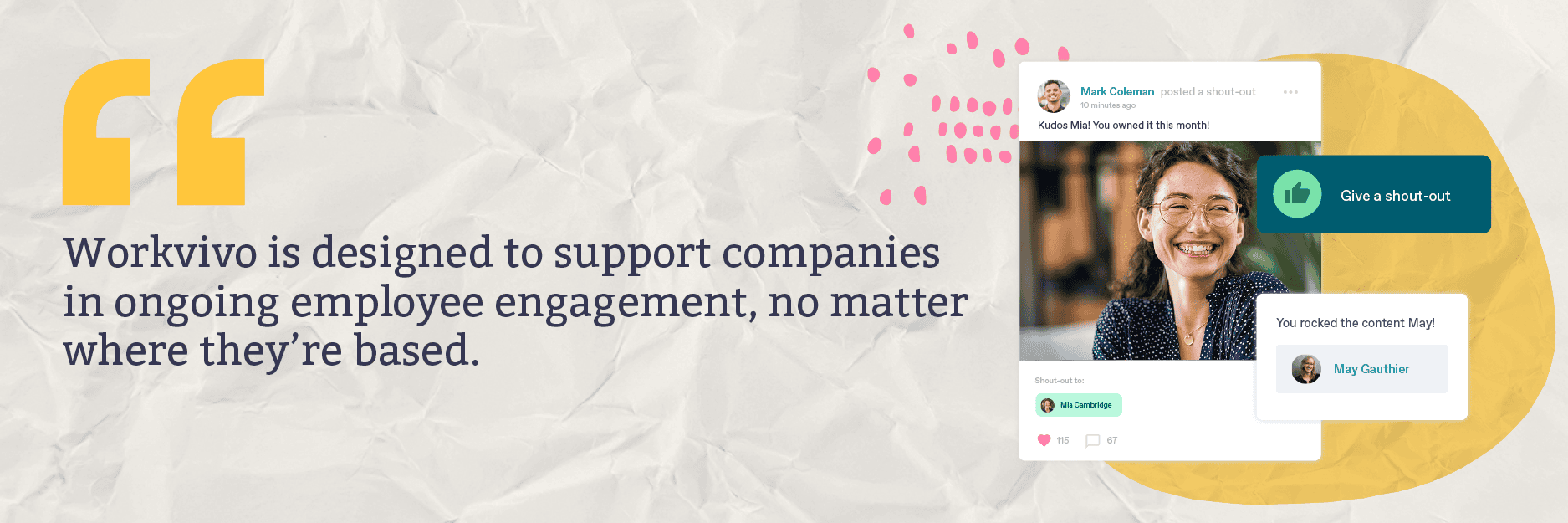How To Build a World-Class Culture – The Ultimate Guide (2022)

Richard Barrett
Director of Marketing
January 5 2022

Many companies find their culture grows almost accidentally, but the best businesses shape theirs for success – and the importance of digital solutions within your culture has never been more critical.
_____
Definition of company culture
Company culture is the shared beliefs and values of any given organization. These values are defined and then put into action through company practices and employee actions.
_____
Whether your business has just five employees, hundreds, or even thousands, culture is sure to be the starting point of all your activities.
These have been challenging times for companies in all sectors and of all sizes, yet the value and relevance of company culture has remained strong during the COVID-19 pandemic, allowing businesses to get to the heart of what makes them great.
Closely linked to engagement, company culture defines everything from employee retention to customer perception. Refining your culture could even hold the key to weathering the so-called ‘Great Resignation’.

88% of job seekers say they carefully consider the company culture of prospective employers before applying for roles or accepting interviews, with a healthy working culture determining the long-term success of your business.
What is company culture?
Company culture is the shared beliefs and values of any given organisation. These values are defined and then put into action through company practices and employee actions.
Company culture is not a defined set of rules. It is rarely communicated directly – instead, it’s outlined through more subtle and indirect means.
Company culture includes:
- Leadership style
- Ethics and company mission
- Workplace environment
- Team goals and expectations
Yet despite its apparent subtleties and complexities, culture is carefully woven into the fabric of each company, so everyone from prospective hires to existing staff, shareholders, and even customers can understand and contribute to it.

Employee impact on culture
Every person working for your company helps define its culture, not only through the work they produce but their attitudes and approach to other team members, projects, and customers.
This is part of what makes company culture so fascinating; it is always in a state of flux and can be built and rebuilt by contributions from your team, evolving with the business and its changing goals.
Employees influence your company by:
- Forming the culture from within
- Influencing customer perceptions
- Growing alongside the company culture
Hiring people who want to help share and shape the culture you’ve built is crucial.
Managerial impact on culture
The structure of your company is another important factor. Some businesses are extremely hierarchical, with clearly defined roles for each employee.
Others are more team-focused, with greater overlap between each job role and a more flexible managerial style. Each of these management styles has its own benefits and pitfalls, but most importantly they each project and foster a vastly different culture.
Managers can:
- Encourage a positive work/life balance
- Reinforce existing cultural norms in your organisation
- Act as role models for spreading your company culture
While high-performing companies share similar cultural traits, there is room for many different leadership styles within a healthy company culture.
Workplace impact on culture
The working environment of your employees also plays a key role. Whether your workspace is an office, a factory, or remote – all of these spaces form another piece of the company culture puzzle.
With more and more employees working from home, many businesses have had to adapt their company culture to accommodate this shift.
Companies with a rigid office-based culture or an inability to ‘go remote’ may have struggled to adjust more than others – or conversely, experienced a limited impact on their cultural values.
Your working environment will:
- Shape the culture of your company
- Attract (and retain) top talent
- Influence productivity and engagement
During the grip of a global pandemic, environmental factors within the workplace are a vital part of what will make employees either remain engaged with their work or lose focus.

Company culture in action
Once you know what to look for, it becomes much easier to identify cultural principles in action.
The following companies all have distinctive cultures:
- Apple
- Nike
- Tesla
- Amazon
Each of these businesses is vastly different from the others, but they also share cultural traits that make them stand out from the pack.
Apple is defined by creative innovation, showcased through the company’s design-led products and elaborate process of unveiling them to the public. This showmanship is something the business has in common with Tesla. Both companies value problem-solving and ‘thinking outside the box’.
Nike emphasises the importance of teamwork over individualism, similarly to retail giant Amazon, which also blends tech innovation with traditional warehouse work practises.
Google gives employees an environment that embraces creativity and data-driven insights, while Facebook focuses on community-building.
Workvivo’s company culture
Workvivo also has its own carefully nurtured company culture. Our business helps you make the most of your internal communications, ensuring smoother workflows and greater team togetherness.
The Workvivo way is all about making things simple for our clients.

Tech-led ingenuity and user-friendliness form the core of our company ethos. We champion flexible new methods of getting things done, helping you take charge of your own company culture and business destiny.
Why is company culture so important?
Great company cultures are not an offshoot of success; they’re a dominant driving force behind it. No matter the industry, the world’s top CEOs invest considerable time and effort in crafting their company’s culture.
Culture is a vital part of ensuring your company messaging is coherent. Without a clear company culture, your team won’t understand how to approach each interaction and project.
When customers don’t know what makes your business tick, they’re up to six times less likely to support and purchase from you. By bridging this gap, you could increase your sales and boost your reputation.
Company culture also impacts recruitment. With no culture, it’s difficult to ensure you’re recruiting the right people. Once you understand what makes you great, suddenly picking the right fit for each role becomes more straightforward.
At the recruitment stage, managers should ask themselves:
- Is this person aligned with our values?
- Are they a team player?
- Will they lead by example?
The best staff also want to join companies where culture is clearly defined:
- Despite the importance of company culture for your workforce, 64% of employees don’t think their company has a distinctive culture.
- According to Gallup, 85% of employees globally are disengaged from their workplace.
- 48% of employees look for a new job when their company culture is a bad fit.
Developing stellar products, delivering superb services, and hiring great people represent only part of the puzzle. Creating an environment where you attract top talent who share the same goals as the business, and where employees want to stick around and contribute their best work, is the true ticket to success.
8 Ways You Can Amplify Your Company Culture
Company culture can only be built from within. Unlike many other areas of your business, it can’t be outsourced, but must be developed in coordination with your team.
Everyone who works for you is responsible for spreading your culture, so keeping your employees connected to what’s happening at work is essential to amplifying it.
At Workvivo, we recommend finding opportunities to let your employees shine. We support our team by providing them with chances to show their strengths, whether through starting a podcast or sharing content they love. No matter where you work, collaboration leads to healthier teams and healthier cultures.
1. Be empathetic
Empathy for your fellow team members is essential for building a healthy company culture, yet 92% of employees feel empathy is an undervalued quality in the workplace.
The best businesses know that their organisation is only as happy as its employees. They invest time and money in making sure the people working for them are content and engaged with their work.
There are lots of ways to build up your team-oriented culture. Team-building activities can be both formal and informal.
Some ever-popular options include:
- Team-building exercises
- Team-based excursions
- Team celebrations
These events also provide great ‘getting to know you’ opportunities. When your employees know each other as people, they’ll feel more motivated to go above and beyond for your company.
2. Use measuring tools
Keep your culture on track! Measure vital stats around both team and customer engagement.
Businesses that view their employees as stakeholders have a marked increase in success and employee retention. Employees want to feel like they’re part of something special, and measurement is a way to assess if your tactics are working.
It’s equally as important not to overmeasure. There are some great ways to assess engagement, without becoming intrusive.
Some of our favourite methods include:
- Pulse surveys
- One-to-ones
- Team catchups
When some (or all) of your team are working remotely, established forms of measurement might be tricky to implement. New technology helps break down those barriers and keep everyone on track.
3. Share your challenges
Each of the people you’ve hired was chosen for a reason. While nobody likes to share their problems, it’s an approach that successful company cultures adopt with great results. Companies that keep their business challenges concealed from the team will never tap into their employee’s full potential.
Those that share their failures as readily as their successes can find new solutions to move forward together, cultivating transparency.
This doesn’t mean that CEOs need to share every single detail with their staff. But it does present opportunities for solving complex challenges as a team and reinforcing your culture.

4. Recognise big (and small) wins
Employee recognition is a key driver of company culture. In 2019, around 32% of companies had dedicated budgets for employee recognition. Likewise, 90% of employees say they feel more connected to their company when their achievements are recognised.
Depending on the resources at your fingertips, there are different methods you can use to reward greatness, including:
- An employee recognition scheme
- Regular team updates
- Digital success sharing via an app like Workvivo
Celebrate each win for the business, and share the successes with your team. As culture is so keenly linked to engagement, this is a wonderful way to keep people motivated.
5. Encourage healthy competition
Companies often view competition as something reserved for outside entities and other businesses. Yet competition within teams can be every bit as beneficial.
The key is to ensure this competition remains healthy and purposeful, never mean-spirited. Healthy competition is easy to spot, particularly when compared to its unhealthy alternative.
Competition with purpose looks like this:
- Honest performance reviews that outline future goalposts
- Rewards for your high achievers to encourage excellence
- Open discussions to identify weak links in the team and strengthen them
- Debate and constructive conflict
If you’ve hired the right cultural fit for your company (and remain tactful in your approach), none of these competitive encounters will turn sour. Instead, businesses will thrive with renewed focus and employee drive.
6. Add a feedback loop
No one employee or manager can effectively ‘own’ your company’s culture. Instead, it is shared between your people.
Every person working for the company can contribute to it, shape it and enhance it. In this respect, inclusion is at the forefront of making your company culture work.
How do we build more inclusive workplaces? Firstly, we must allow space for employee feedback on existing practises:
- Seek out employee insights
- Incorporate an open-door policy
- Encourage transparency
When you have data from your employees, look for ways you can use it to enhance your company culture and ensure your employees know their voices are heard.
7. Connect content to your goals and values
The content you produce as a company should always clearly link to your goals and business values.
This is a great way to ensure your culture is amplified and understood at all levels. Consider ways that the culture can be physically represented:
- If your business has a physical office space, would visitors be able to tell what kind of company you are?
- Does your internal communications strategy accurately represent the business?
- Do you ensure all your output is aligned with the company values?
If you can answer ‘yes’ to these questions, there’s a good chance your culture is already coherent. Well done!
If not, then following our guidelines will help you get on track.
8. Harness new technology
Technology is more important to company culture than ever before. The COVID-19 pandemic has led to radical shifts in the way people work. Instead of showing up at a centralised office, many employees now prefer to work remotely.
As the pandemic starts to wane, few are willing to give up their newfound remote working independence. It seems we’re now past the early teething stages, and employees have adjusted to this ‘new normal’.
Companies that don’t go with the flow are likely to see their culture suffer as a result, with demotivated employees and the possibility for mass resignations. These are problems we have seen throughout the last eighteen months.
How can companies adapt without compromising on quality output and staff engagement?
Use technology.

Workvivo is designed to support companies in ongoing employee engagement, no matter where they’re based.
As a truly comprehensive employee communication tool, there’s no better way to amplify your culture without having to coerce your people back to the office.
The 4 Secret Ingredients of World-Class Company Cultures
The best companies tend to share similar characteristics. There are a few non-negotiable traits you’ll find in top culture-focused organisations, including:
Inclusion
The COVID-19 pandemic has given companies a rare opportunity to redefine their company cultures.
Businesses often talk about the perks of working for their respective organisations, but these ‘perks’ tend to still end up excluding someone. Free coffees, workplace benefits, and even regular paid home cleanings will tempt some employees to stick around, but what about staff who work remotely?
Many businesses require frontline staff to operate. Coffee shops need baristas, offices need cleaners, and factories need personnel. Yet these people are all traditionally excluded from the company culture conversation.
The best companies know they need to engage with all members of their team.
Recruitment
Finding the right people for your company is also vital for nurturing your culture. This is something the world’s greatest businesses understand. More than 75% of recruiters have experienced candidates changing their mind before accepting a job offer, with prospective hires becoming pickier about where – and how – they work.
Recruiters at globally successful, culture-led businesses can see the potential in individuals. They focus on how new hires that will fit into the culture alongside how they will meet the requirements of their job role.
Engagement
Engaged employees always outperform their disengaged counterparts. With a talent shortage looming for many industries, the results of this engagement will be seen throughout your company, from the work produced to greater customer satisfaction and employee retention.
The best company cultures want to foster success and focus on giving their employees space to shine and bring their best selves to work each day.
Belonging
People want to work for companies they respect. This has never been truer than amid the Great Resignation.
According to Gallup, 88% of companies think employees leave because they want a higher salary, when the reality is only 12% of job leavers quit for this reason. What employees really want is to belong.
Belonging is linked to a staggering 56% rise in productivity. Businesses need to go above and beyond to hire and retain the right people, no matter whether they are providing direct customer care or forming strategies away from the shop floor.
When employees feel valued, they’ll become your biggest cheerleaders and hardest workers.
How do you build a world-class company culture?
When building your company culture, don’t be afraid to look around at businesses you admire. As we have explored, many of the world’s top companies have similar cultural priorities:
- Cultivating employee (and consumer) trust
- An environment of inclusion and belonging
- Respect for innovation and new technology
These principles are universal and can be adapted to suit your scale and industry. Ask yourself:
- Why do successful businesses include these aspects in their culture?
- How many of these principles are we already using?
- How can we adopt the rest?
Using tools designed to help amplify your culture will ensure trust, inclusion, and innovation are at the core of your business.
4 Top Tips To Successfully Build a Digital-First Culture
Your culture needs to incorporate a digital element to survive.
There are many compelling reasons to do so:
- Digital adoption is directly linked to long-term financial success and productivity
- The top 5% of companies invest more than other businesses in digital tools and techniques
- Companies are actively embracing digital solutions during the pandemic
How do you put these elements into action for your own company?
Do the homework
No company can build a digitally-led culture without first doing some research.
Yet digital culture has never been more important, particularly with the growth of remote work and the uncertainty of the ongoing pandemic.
Now is a great time to find new digital solutions that will futureproof the company in the months and years to come.
Remember to innovate
Innovation should be carefully incorporated into the business culture. This comes from the top down, with the addition of tech solutions that work for your employees and the company, rather than against them.
User-friendliness should be a key concern when adding innovation to the business. Don’t rely too heavily on instant messaging tools, but instead opt for an all-inclusive employee app to keep all your communication in one secure place.

Communicate with management
Your management team will be at the forefront of building your digital culture.
They are likely to be the driving force of finding new ways of working and making sure they suit office, remote and hybrid workers.
Management will also help communicate your new methods effectively to the rest of your team, so make sure they’re always in the loop.
Keep your team involved
Just as managers need to know what’s happening within your business, so do employees at all levels.
They may have valuable insights to share or help make sure your digital apps and tools don’t disrupt company procedures, but instead enhance your culture.
Summary
Building your company culture is an integral part of strengthening your business and your brand.
The process of building your culture can often seem overly complicated and daunting.
Hire the right people, give them the tools they need to succeed, and your company culture will start to take shape.
As changing circumstances continue to challenge the modern workplace, with Workvivo you can always be sure the values of your company culture are upheld.
Workvivo is there to keep your company connected, no matter how or where you work.